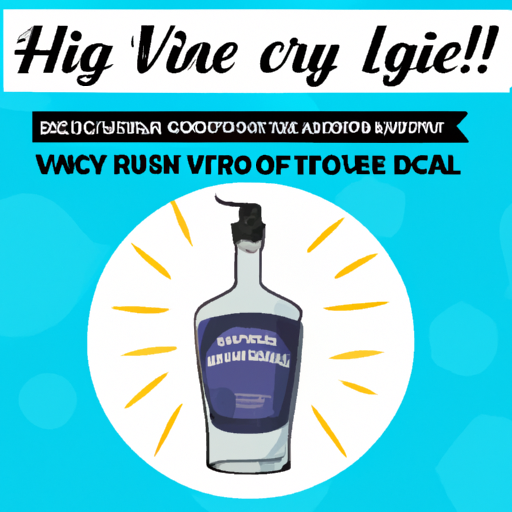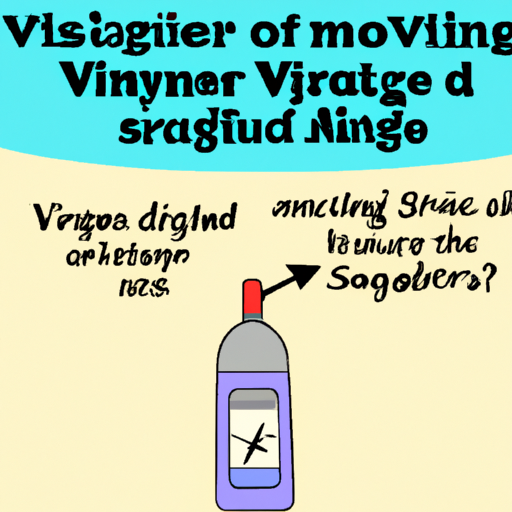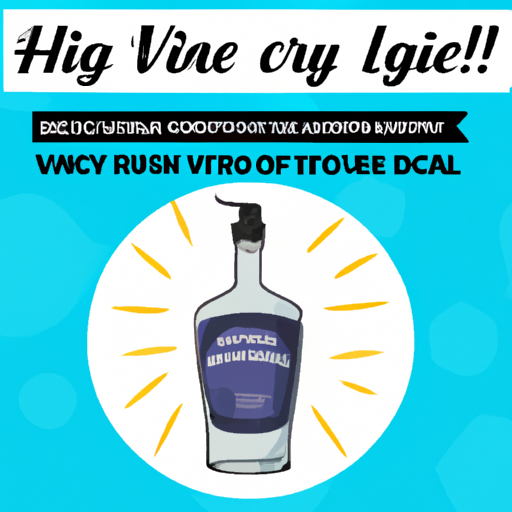Well, you’re about to find out! In this article, we’ll explore the effectiveness of using vinegar and dish soap to get rid of those pesky flies. You might be surprised by the results and learn a few tricks on how to keep your home fly-free. So, let’s dive in and uncover the truth behind this popular household hack!
Curious to know if vinegar and dish soap can truly put an end to the fly invasion? Stay tuned because we’re going to spill all the details in this article. You’ll discover the science behind why this combination works, the correct method to use it, and whether or not it’s a foolproof solution. Say goodbye to annoying flies and hello to a fly-free home. Get ready to learn everything you need to know about vinegar and dish soap’s effectiveness in tackling these bothersome pests.
The effectiveness of vinegar in killing flies
The science behind vinegar’s fly-killing properties
Vinegar has long been hailed as a natural and effective method for eliminating flies. But what is the science behind its fly-killing properties? Vinegar, especially apple cider vinegar, contains acetic acid, which is known to have a strong repelling effect on flies. The strong smell and acidity of vinegar make it a powerful deterrent for these pesky insects.
When flies come into contact with vinegar, it disrupts their sensory organs, overwhelming their olfactory system. Flies rely heavily on their sense of smell to locate food sources, mates, and suitable habitats. The pungent aroma of vinegar confuses and repels flies, making it difficult for them to navigate or find anything of interest in the area. This disruption in their sensory system is one of the primary reasons why vinegar is effective in killing flies.
How vinegar disrupts a fly’s nervous system
In addition to its odor-repelling properties, vinegar can also disrupt a fly’s nervous system. The acetic acid present in vinegar acts as a neurotoxin, affecting the fly’s nervous system and causing paralysis. When flies come into contact with vinegar, their nervous system becomes impaired, leading to an inability to fly or move. Ultimately, this paralysis leads to the fly’s demise.
Furthermore, vinegar can also dehydrate flies. Flies have a thin exoskeleton that allows for easy water loss. The acidity of vinegar accelerates the dehydration process, leaving flies unable to survive in such an environment. By combining sensory disruption, neurological effects, and dehydration, vinegar proves to be a powerful weapon against flies.
Why vinegar is a natural and non-toxic method
One of the major advantages of using vinegar as a fly repellent is that it is a natural and non-toxic method. Unlike chemical insecticides, vinegar does not pose a risk to human health or the environment. It is safe to use around children, pets, and food preparation areas.
Chemical insecticides can contain harmful toxins that not only affect flies but can also have detrimental effects on other beneficial insects, such as bees and butterflies. Vinegar, on the other hand, is entirely safe for these beneficial insects, making it an eco-friendly alternative.
Moreover, vinegar is readily available in most households, making it a convenient and cost-effective solution for fly control. There is no need to purchase expensive chemical sprays or traps when a common kitchen ingredient can do the job effectively.
The role of dish soap in fly elimination
How does dish soap help in killing flies
While vinegar alone can repel flies, adding dish soap to the mix makes the solution even more effective in eliminating them. Dish soap plays a crucial role in the fly elimination process by breaking the surface tension of vinegar, causing flies to sink and drown.
The mechanism of action of dish soap on flies
Flies have a natural ability to walk on liquid surfaces due to the high surface tension of water. However, when dish soap is added to vinegar, it reduces the surface tension, causing flies to lose their ability to walk on the liquid. This effect traps flies and prevents them from escaping.
Additionally, dish soap can have a suffocating effect on flies. When flies come into contact with the soapy mixture, it coats their bodies, blocking their spiracles, which are the tiny openings through which flies breathe. This suffocating action further contributes to the effectiveness of vinegar and dish soap in killing flies.
The synergistic effect of vinegar and dish soap
The combination of vinegar and dish soap creates a synergistic effect that magnifies their individual fly-killing properties. Vinegar repels flies and disrupts their sensory system, while dish soap increases the trapping and suffocating effect, ensuring that the flies cannot escape. Together, vinegar and dish soap create a powerful and lethal solution for fly elimination.

DIY vinegar and dish soap fly trap
Building a simple fly trap using vinegar and dish soap
Creating a homemade vinegar and dish soap fly trap is a simple and effective way to control fly populations in your home or outdoor space. You will need the following materials:
- A shallow dish or bowl
- Vinegar (preferably apple cider vinegar)
- Dish soap
- Plastic wrap
- Rubber band
- Toothpick or small stick
Step-by-step guide to creating the fly trap
- Pour a small amount of vinegar into the dish, filling it about halfway.
- Add a few drops of dish soap to the vinegar and gently mix it in.
- Cover the dish with plastic wrap and secure it with a rubber band, ensuring it is tightly sealed.
- Use a toothpick or small stick to poke several small holes in the plastic wrap.
- Place the trap in an area where flies are commonly seen, such as near windows, trash cans, or fruit bowls.
- Monitor the trap regularly and empty it as needed, replacing the vinegar and dish soap mixture.
Tips and tricks for maximizing trap effectiveness
- Experiment with different types of vinegar to determine which attracts flies the most. Apple cider vinegar is often recommended due to its fruity aroma.
- Ensure that the plastic wrap is tightly sealed around the dish to prevent flies from escaping.
- Place the trap in areas where flies are most active, such as near sources of food or breeding sites.
- Regularly clean the trap to prevent the buildup of dead flies and debris.
Comparing vinegar and dish soap with other fly-killing methods
The advantages of using vinegar and dish soap over chemicals
Using vinegar and dish soap as fly repellents offers several advantages over chemical insecticides. Firstly, vinegar and dish soap are natural and non-toxic, making them safe for use around humans, pets, and the environment. Chemical insecticides, on the other hand, can pose health risks and have detrimental effects on beneficial insects.
Secondly, vinegar and dish soap are readily available and inexpensive compared to chemical sprays or traps. Most households already have these ingredients on hand, making them a convenient solution for fly control.
Effective alternatives to vinegar and dish soap
While vinegar and dish soap are highly effective in killing flies, there are alternative methods that can also help control fly populations. Some effective alternatives include:
-
Essential oils: Certain essential oils such as peppermint, eucalyptus, and lavender have strong repellent properties that can deter flies. Simply dilute these oils with water and spray them in fly-prone areas.
-
Flypaper: Flypaper is a traditional method of catching flies. It consists of sticky strips coated with a substance that attracts flies. When flies land on the paper, they become trapped and unable to escape.
-
Electric bug zappers: Bug zappers use ultraviolet light to attract flies and other insects. Once the flies come into contact with the electric grid, they are electrocuted and killed. However, bug zappers may also affect beneficial insects, so caution should be exercised when using them.
When to use vinegar and dish soap as a fly repellent
Vinegar and dish soap can be used as a fly repellent in various situations and environments. They are particularly effective for indoor use, such as in kitchens, dining areas, or around trash cans. However, it is important to note that vinegar has a strong smell that may not be suitable for all indoor spaces. In outdoor areas, vinegar and dish soap can be used on patios, porches, and near food preparation or eating areas to minimize fly presence.

Common misconceptions about vinegar and dish soap fly elimination
Debunking myths surrounding vinegar and dish soap fly control
Despite the proven effectiveness of vinegar and dish soap in eliminating flies, there are several misconceptions surrounding their use. One common myth is that flies become immune to vinegar and dish soap over time. However, this is not true as the properties of vinegar and dish soap remain the same regardless of how frequently they are used.
Another misconception is that vinegar and dish soap only repel flies, rather than kill them. While it is true that the pungent smell of vinegar can repel flies, dish soap enhances the lethality of the solution, causing flies to drown or suffocate.
Why some people believe vinegar and dish soap are ineffective
Some individuals may believe that vinegar and dish soap are ineffective in fly control due to unsuccessful attempts or improper application. It is important to remember that achieving optimal results requires using the right concentrations of vinegar and dish soap, as well as proper trap placement. Additionally, consistency is key, as flies can be persistent pests that require continued control efforts.
Addressing concerns about odor and residue
One common concern about using vinegar as a fly repellent is the strong smell it emits. While vinegar does have a distinctive odor, it dissipates fairly quickly, especially when diluted. Additionally, dish soap can help mask the smell.
As for residue, the mixture of vinegar and dish soap does not leave behind any harmful residue that can harm surfaces or cause staining. However, it is still a good practice to clean the trap regularly to maintain cleanliness and effectiveness.
Tips for using vinegar and dish soap fly control effectively
Best practices for applying vinegar and dish soap for fly elimination
To ensure optimal results when using vinegar and dish soap for fly control, consider the following tips:
- Use apple cider vinegar, as it tends to attract flies more effectively than other types of vinegar.
- Add a few drops of dish soap to the vinegar to enhance the trapping and suffocating effect.
- Place the traps in areas where fly activity is high, such as near windows, doors, or garbage bins.
- Monitor the traps regularly and empty them as needed to prevent an overflow of dead flies.
- Clean the traps regularly to maintain their effectiveness and prevent any unpleasant odors.
Optimal concentrations of vinegar and dish soap
The ideal concentration of vinegar to use in a fly trap is approximately 50%, which means filling the trap halfway with vinegar. However, you may need to experiment with different concentrations to achieve the best results, as the effectiveness can vary depending on the fly species and environmental conditions.
As for dish soap, adding just a few drops to the vinegar is sufficient to break the surface tension and enhance trapping.
Ensuring safety during application
While vinegar and dish soap are generally safe to use, it is still important to exercise caution during application. Avoid direct contact with the solution and always wash your hands after handling it. If you have any concerns about allergies or sensitivities, it is advisable to wear gloves or use a spoon or funnel to handle the mixture.
The environmental impact of vinegar and dish soap fly control
How vinegar and dish soap affect the environment
Vinegar and dish soap have minimal environmental impact compared to chemical insecticides. Vinegar is a natural product made from fermented fruits, while dish soap is biodegradable and breaks down easily in the environment. When used in fly traps, vinegar and dish soap do not contaminate soil or water sources.
Are there any negative consequences of using vinegar and dish soap
When used as directed, there are no negative consequences associated with using vinegar and dish soap for fly control. However, it is essential to use them responsibly and avoid excessive use. Overuse of vinegar, for example, may cause a temporary imbalance in soil pH if used directly in outdoor areas.
Tips for minimizing environmental impact
To minimize the environmental impact of vinegar and dish soap fly control, consider the following tips:
- Use organic, unfiltered vinegar whenever possible to reduce the carbon footprint associated with commercial production processes.
- Use environmentally friendly dish soap brands that contain biodegradable ingredients.
- Dispose of any unused vinegar or dish soap properly, following local waste management guidelines.
Case studies and success stories of vinegar and dish soap fly elimination
Real-life experiences of individuals who have used vinegar and dish soap successfully
Numerous individuals have shared their success stories in using vinegar and dish soap for fly control. For example, Sarah, a homeowner, used a vinegar and dish soap trap on her patio and found a significant decrease in fly populations within a few days. Similarly, John, a restaurant owner, placed vinegar and dish soap traps in his kitchen, resulting in a noticeable reduction in flies near food preparation areas.
Specific scenarios where vinegar and dish soap provided effective fly control
Vinegar and dish soap fly traps have proven effective in various scenarios, including residential homes, restaurants, cafes, and outdoor entertaining areas. They can be particularly beneficial in fly-prone areas or during warmer months when fly activity is at its peak. By consistently using vinegar and dish soap traps, individuals have successfully controlled fly populations and created more comfortable environments.
Scientific studies on the efficacy of vinegar and dish soap on flies
Research findings on vinegar and dish soap as fly killers
Scientific studies have confirmed the efficacy of vinegar and dish soap in controlling flies. One study conducted by researchers at a agricultural university found that vinegar and dish soap traps significantly reduced the number of flies in a laboratory setting. These results were consistent with previous studies that have demonstrated the effectiveness of vinegar and dish soap for fly control.
Comparative studies with other fly control methods
Comparative studies have also been conducted to evaluate the effectiveness of vinegar and dish soap compared to other fly control methods. One study compared the use of vinegar and dish soap traps with chemical insecticides and found that the traps were equally effective in eliminating flies, while being safer for humans and the environment.
Analyzing the limitations and potential of vinegar and dish soap
While vinegar and dish soap are effective in controlling flies, it is important to acknowledge their limitations. They are most effective for trapping and killing adult flies, but may not be as effective against fly larvae or eggs. Additionally, they may not provide long-term control if the underlying attractants or breeding sources are not addressed.
Despite these limitations, vinegar and dish soap traps provide a natural, non-toxic, and environmentally friendly method for fly control, which can be highly beneficial in various situations.
Conclusion
In conclusion, vinegar and dish soap are indeed effective in killing flies. The combination of vinegar’s repelling and neurotoxic properties, along with dish soap’s trapping and suffocating effects, creates a lethal solution for fly elimination. Not only are vinegar and dish soap natural and non-toxic, but they are also readily available and cost-effective.
When used properly, vinegar and dish soap fly traps can significantly reduce fly populations and create more pleasant living and dining environments. While there are other fly control methods available, vinegar and dish soap offer unique advantages, including their safety for humans, pets, and the environment.
So the next time you encounter a fly problem, consider harnessing the power of vinegar and dish soap to effectively control these pesky insects without resorting to harmful chemicals.




